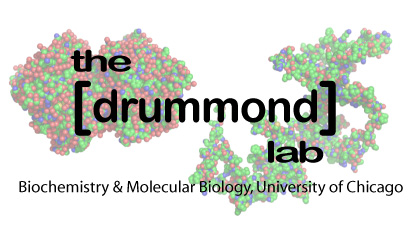Drummond

To carry out biological functions, a typical protein must fold into a complex structure encoded by its amino-acid sequence. Alterations of that sequence often cause misfolding, disrupting function and also creating toxic, aggregation-prone molecules.
Protein misfolding causes major age-related human neurodegenerative diseases, shapes quality control mechanisms inside the cell, and influences how rapidly protein-coding genes accumulate sequence changes over evolutionary time. Yet strikingly little is known about the major causes, amounts, or consequences of protein misfolding. Key open questions include: What are the dominant causes of protein misfolding in normal, disease-afflicted and aging cells? What fraction of newly synthesized proteins misfold, and why? What is the error rate of protein synthesis? Why are misfolded proteins toxic, and how do cells detect and respond to them?
We seek answers to these questions, taking an integrated biochemical, genetic, and evolutionary approach.